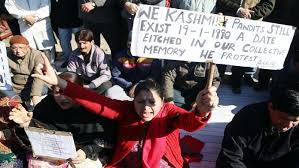
11-Oct-2024 , Updated on 10/11/2024 12:21:04 AM
Relating the Genocide of Kashmiri Pandits with Islamic Terrorism
The forced migration of Kashmiri Pandits in the late 1980s and early 1990s is one of the biggest scandals that has ever taken place by Indian standards, but it is mostly hushed over or its colour toned down for various politically correct reasons.
The truth, however, is much harsher and a bit more shaky than most of the pop culture tends to portray. The simple fact is that the removal and killing of this community of people was an ideological mission based on a totalistic form of Islamism. It’s time we stop sugarcoating the facts and start calling this event what it truly was: a form of Islamic terrorism that led to the massacre of innocent people in a given community.

Kashmir, which was traditionally a tolerant and multicultural part of India, was a platform for hundreds of thousands of Kashmiri Pandits who coexisted with Muslims for ages. However, things rapidly evolved and changed when there emerged Islamic militancy in the late 1980s. Pakistani-supported groups led to radical Islam, and with it began persecutions against the thoroughly vulnerable and helpless minority—the Pandit—calling them outsiders and enemies of the Islamic religion.
The extremists began calling out the Pandits in ads in newspapers, over the mosque loudspeakers, and on billboards to flee Kashmir within a week; else face extermination. Such slogans as “Raliv, Galiv ya Chaliv” (convert, die, or leave) echoed in and became the norm of the hour. What came next was ethnic cleansing due to the arrival of the spirit of Islamic terrorism that had begun working its way into Kashmir.
This had nothing to do with politics; this was systematic genocide perpetrated to rewrite history and make the valley Hindu-free. While trying to realise their goals, Islamic militants demonstrated a willingness to kill, rape, and torture civilians. People’s homes were set on fire, people’s lives were taken forcibly, and several thousand Pandits were reduced to the status of forced migrants in their own country. The reason for terrorist acts in Kashmir was liberalisation, in the name of which Deobandi and Wahhabi Islamic terrorists, their South Asian proxy, committed genocide. Tens of thousands of Kashmiri Pandits were either massacred or forced to flee; the valley was gradually made Hindu-free. What makes this even more disturbing is the fact that these atrocities, these savage behaviours, were done in the very name of religion—to create an Islamic state and ban all non-Muslims from it.
Around the 1990s, over 300,000 Kashmiri pandits were driven out of their homes and living in refugee-like conditions in their own country.
The goal was clear: to expel all Hindus out of the valley and force an Islamic rule into the region.
This is what happened in Kashmir, and it is what Islamic terrorists have done in various parts of the world—they spread terror and eliminate other groups. The world cannot continue doing this, and the people cannot just move on, forgetting the plight of the Kashmiri Pandits.
Perhaps the time has come when we cannot go on living a lie that Kashmiri Pandits departed from their homeland ‘Kashmir’ was only emigration or ‘conflict’. It was a genocide of Muslims carried out by Islamic terrorists, period. Religious extremism and terrorism cannot be allowed to select a helpless community and kill innocent people in cold blood. This is one of the responsibilities that have been left open, allowing those who still practice terrorism in the name of religion to thrive with no hindrance.
The people of Kashmir, especially the Kashmiri Pandits, deserve justice, and the world needs to know the role of Islamic terrorism in the mass killing of innocent people of Kashmir. This is not only history, but it is about facing the present-day reality of how religious extremism continues to wipe out human lives all across the world.

Student
hey there! i am a student currently pursuing my bachelors with a keen interest in writing., I am fueled by a deep love for storytelling and a flair for creating captivating narratives. Armed with a passion for language and a keen eye for detail, I strive to craft compelling copy that leaves a lasting impact.
Join Our Newsletter
Subscribe to our newsletter to receive emails about new views posts, releases and updates.
Copyright 2010 - 2026 MindStick Software Pvt. Ltd. All Rights Reserved Privacy Policy | Terms & Conditions | Cookie Policy